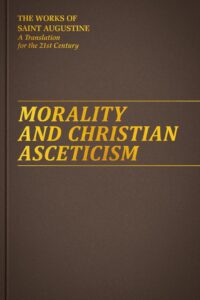Our friends at New City Press, a cosponsor of The Augustine Blog, announced recently that they will be publishing in November the 45th volume in their landmark translation series The Works of Saint Augustine: A Translation for the 21st Century. The newest volume is titled Morality and Christian Asceticism. We thought blog readers would enjoy a sneak peek at the volume, so below you will find the Introduction to the volume written by Series Editor Boniface Ramsey. He gives helpful background on the nine writings by Augustine that are included in the volume and explains their inclusion in the volume.
Intr oduction
oduction
The Christian writers of the first few centuries, Augustine among them, would not have intentionally placed their writings under headings like “moral” or “ascetical,” which were divisions within theology that were not formally recognized until after the Middle Ages. Nonetheless, the early Christian writers frequently focused on themes that would fall within the current categories of morality and asceticism, just as they did on others, and it is convenient for us today to group their writings together in some sort of thematic order. Hence this collection of Augustine’s moral and ascetical writings, which, however, do not exhaust the categories. There are more of the same, for example, in another volume in this series entitled Marriage and Virginity, and numerous other writings of Augustine, besides the ones in these two volumes, devote large amounts of space to moral issues and occasionally to ascetical issues. Indeed, nothing less than the mighty City of God can be seen as one long moral treatise.
Seven of the eight works in this volume have to do with obviously moral/ascetical issues. In terms of influence, the first two of these seven, Lying (De mendacio) and Against Lying (Contra mendacium), are certainly the most important. Augustine’s absolutist understanding of truthfulness and his uncompromising strictures against deception in any of its forms have shaped Western thinking and acting to this day. As for The Christian Combat (De agone christiano), which is in two parts, only the first part deals with Christian morality, which Augustine describes as a combat between the Christian soul and the invisible forces of evil; the second part lays out the Christian faith on the one hand and its heretical variants on the other. The Work of Monks (De opere monachorum), the sole treatise in early Christian literature that is devoted to this topic, is primarily concerned with defending monastic labor against monks who demean it and who claim that they should be excused from work in order to give themselves wholly to prayer. The shortest of the writings presented here, The Advantage of Fasting (De utilitate jejunii), is a sermon in which Augustine discusses several topics—not only the value of appropriate fasting but also the relationship of the flesh and the spirit and, finally, the need for unity in the Church. In Patience (De patientia), Augustine distinguishes between true and false patience (whichever one it may be depends on a person’s motivation) and points out that true patience is a divine gift. The Care to Be Taken of the Dead (De cura pro mortuis gerenda) calls for prayers to be said for the dead, to whom they will be of value only if they have lived in such a way on earth as to be able to profit from prayers. He also advocates for respect to be shown to the bodies of the dead, while acknowledging that how respectfully a corpse is treated is not a matter of ultimate importance.
An eighth work, Instructing Beginners in Faith (De catechizandis rudibus), lies outside the moral/ascetical category of the other seven. As the Latin title helps to make clear, this is a catechetical treatise, and it touches upon virtually every aspect of catechesis, including even the state of mind of the catechizer. However, to the extent that any valid catechesis has to provide some moral teaching, Instructing Beginners in Faith does so in the context of giving a full picture of the Catholic faith and way of life that the catechumens, the “beginners,” have opted to embrace. As a method of catechesis, this relatively early work of Augustine has enjoyed remarkable influence through the centuries, and it still offers valuable insights.
The writings in this volume are arranged in chronological order, as best as can be determined (the dating of some is uncertain), except for the second, Against Lying, which deals with the same subject as the first, although at a more than twenty-year interval.